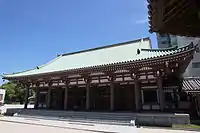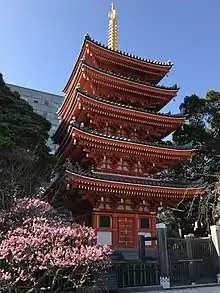Tōchō-ji
Tōchō-ji (東長寺) is a Shingon temple in Hakata, Fukuoka, Japan. Its honorary sangō prefix is Nangakuzan (南岳山). It was founded by Kūkai in 806, making it the oldest Shingon temple in Kyushu.

History
According to tradition, Kūkai or Kobo-daishi set up this temple when he came back from China and prayed for the eastward dissemination of Tantric Buddhism. It was originally situated at the seaside area. After it burned down at the end of the 16th century it was relocated to the present site by Kuroda Tadayuki, the second lord of Chikuzen province. The second, the third, and the eighth lord of the Kuroda family are buried here.
Senjukannon
The temple houses a Senjukannon statue ('thousand-armed Goddess of Mercy', Avalokiteshvara) made in the Heian era. It was carved from a single log of Chinese black pine. The statue is only 87 centimeters in height but stands up with a stately atmosphere. In 1904 it was designated as a national treasure. As a "hidden Buddha" it is concealed and can only be seen during the birthday celebrations for Kūkai .
The Rokkaku-dō
This is a hexagonal (rokkaku) building with revolving bookshelves for sutras and sculptures. In 1842, the local merchant Bungoya Eizō raised money from merchants throughout western Japan and invited a carpenter named Itō Hirazaemon to build this sanctum. The building is open on the 28th of every month[1]
Fukuoka Daibutsu (Great Buddhist statue)
The carving of the statue started in 1988 and it took 4 years to finish. The statue is 10.8 meters in height and 30 tons in weight. After the Daibutsu of Nara and the Daibutsu of Kamakura, this is the largest statue of a seated Buddha in Japan. The ring of light behind the Buddha stands 16.1 meters in height and is carved with numerous images of Buddha. Besides the statue is a treasure exhibition hall.









 1821
1821
External references
- "About Tocho-ji Temple - Fukuoka Travel Guide | Planetyze". Planetyze. Retrieved 2017-11-22.
| Wikimedia Commons has media related to Tōchō-ji. |